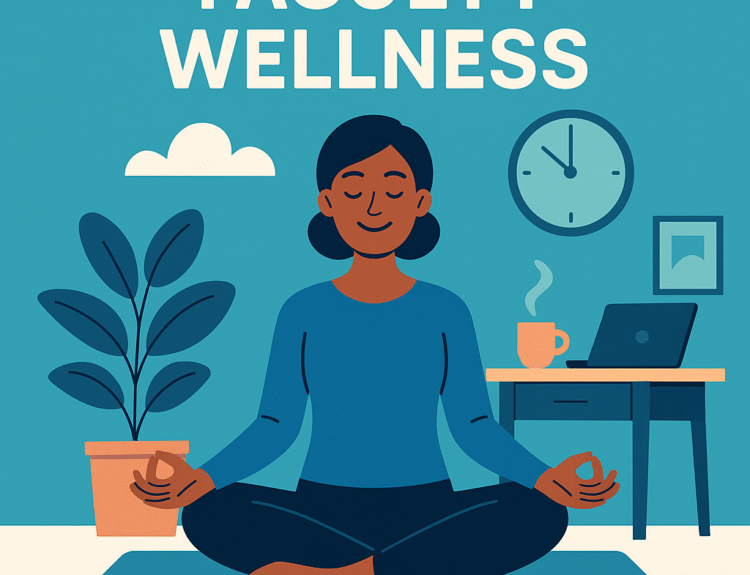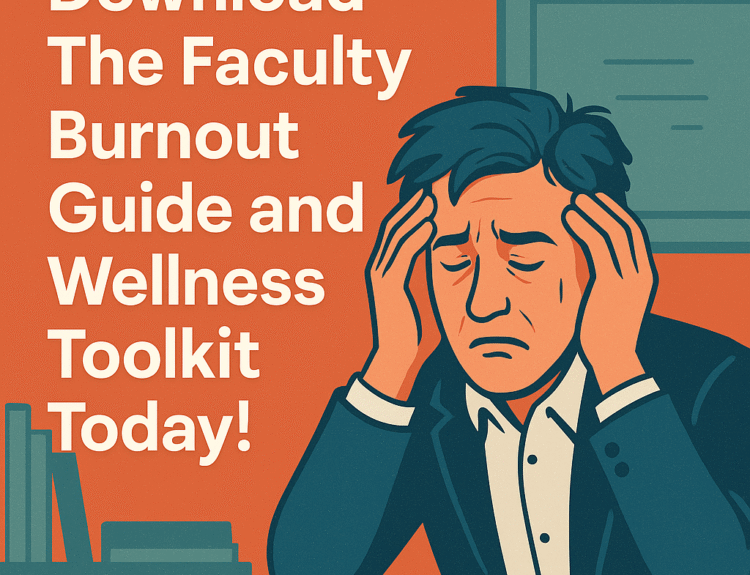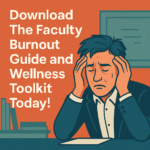Burnout doesn’t just appear overnight—it builds over time. Faculty juggle demanding workloads, student needs, research pressure, and administrative tasks, all while navigating their own personal lives. A sustainable self-care strategy can help reduce stress and boost mental well-being throughout the academic year.
This faculty self-care calendar offers small, actionable monthly wellness routines that align with the academic calendar—easy enough to implement, powerful enough to make a difference.
January: Refresh and Reset
Theme: Reflection + Intention
January is the perfect time to pause and assess.
- Journal for 5–10 minutes each morning or week: What worked last semester? What didn’t?
- Set a “word of the year” or intention that centers balance, growth, or restoration.
- Try a digital detox weekend—log off and recharge.
Pro Tip: Reorganize your workspace to feel less cluttered and more calm.
February: Nourish the Body and Mind
Theme: Small Acts of Self-Love
The middle of winter can be draining. Prioritize gentle care.
- Schedule one joyful activity a week: a walk, a good book, or a meal with a friend.
- Add one nourishing food to your daily meals (hello, leafy greens or cozy soups!).
- Try a 10-minute guided meditation once a day—or whenever grading stress hits.
Remember: Your wellness fuels your work, not the other way around.
March: Spring Clean Your Routine
Theme: Clear the Mental Clutter
As midterms approach, burnout peaks. Make space—physically and emotionally.
- Declutter your inbox by unsubscribing from unnecessary emails.
- Practice a “no” strategy: say no to one extra ask that doesn’t align with your goals.
- Schedule weekly 30-minute “wellness blocks” on your calendar (walks, naps, podcasts).
Consider asking your department to adopt a “no meeting” day each week for mental space.
April: Connect and Recharge
Theme: Peer Support + Professional Boundaries
Connection combats burnout.
- Schedule a low-stakes coffee with a colleague (no shop talk required).
- Identify one work boundary to reinforce, like no emails after 6 p.m.
- Share a wellness resource with your students. Modeling self-care matters.
Peer check-ins boost morale—faculty wellness is a team effort.
May: Celebrate and Reflect
Theme: Closure + Appreciation
The semester’s end brings relief—and fatigue.
- List three things you’re proud of this semester.
- Write one thank-you email or note to a colleague or student.
- Block a “recovery day” post-graduation with zero responsibilities.
Pro Tip: Plan your summer intentionally. What rest do you need?
June: Rest and Recalibrate
Theme: Rejuvenation + Recreation
Use summer’s slower pace for true rejuvenation.
- Schedule screen-free afternoons or “slow mornings.”
- Take a class or read a book just for pleasure, not for tenure or teaching.
- Spend more time outside: walks, hikes, or even patio journaling count.
Rest is productive. Give yourself permission to fully unwind.
July: Reignite Your Passions
Theme: Curiosity + Joy
Reconnect with what excites you professionally and personally.
- Attend a conference or webinar on a topic that lights you up.
- Begin a passion project unrelated to your academic role.
- Reevaluate your goals: what are you excited to bring into fall?
Passion fuels purpose. Even one spark can reignite your energy.
August: Ease Into Structure
Theme: Gentle Preparation
August is the bridge between summer and fall chaos.
- Use the last week of break to gradually reintroduce structure.
- Revisit your calendar and set realistic expectations for the new semester.
- Prepare one “wellness habit” to carry into the school year (daily walk, morning journaling, weekly therapy, etc.).
Start how you want to continue—with intention and care.
September: Embrace the Reset
Theme: Intentional Beginnings
It’s a new school year. Choose how you show up.
- Block one “white space” hour weekly with no meetings or obligations.
- Try a breathing exercise before class or meetings.
- Check in with your own needs weekly: What do I need more or less of?
Teaching with presence starts with being present.
October: Strengthen Your Support System
Theme: Community + Check-ins
Mid-semester is challenging—lean into your community.
- Start or join a faculty peer support group or wellness circle.
- Check in on your mental health—schedule therapy if you need it.
- Host a “wellness lunch” with your department (no shop talk!).
Burnout isn’t a personal failure—it’s a structural challenge best met together.
November: Practice Gratitude and Grounding
Theme: Perspective + Preparation
November is a time to reflect on what grounds you.
- Write a weekly gratitude list of three things.
- Try grounding exercises when overwhelmed (5-4-3-2-1 senses check-in).
- Prepare grading and final deadlines with buffer days built in.
Grounded gratitude keeps stress in check, even in high-pressure weeks.
December: Unplug and Reflect
Theme: Closure + Celebration
Wrap up the year with kindness toward yourself.
- Set an “out of office” and honor it.
- Reflect: What wellness practices helped? What will you bring into the new year?
- Celebrate your wins—big or small.
You made it through the year. That matters.
Final Thoughts
Faculty wellness is not a luxury—it’s a foundation. Small, intentional acts of self-care, practiced consistently, can have a lasting impact. This calendar isn’t about perfection; it’s about showing up for yourself, one month at a time.




















